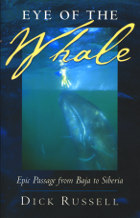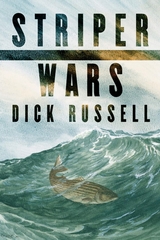

When populations of striped bass began plummeting in the early 1980s, author and fisherman Dick Russell was there to lead an Atlantic coast conservation campaign that resulted in one of the most remarkable wildlife comebacks in the history of fisheries. As any avid fisherman will tell you, the striped bass has long been a favorite at the American dinner table; in fact, we've been feasting on the fish from the time of the Pilgrims. By 1980 that feasting had turned to overfishing by commercial fishing interests. Striper Wars is Dick Russell's inspiring account of the people and events responsible for the successful preservation of one of America's favorite fish and of what has happened since.
Striper Wars is a tale replete with heroes--and some villains--as the struggle to save the striper migrated down the coast from Massachusetts to Maryland. Russell introduces us to a postman at arms against a burly trap-net fisherman, a renowned state governor caving to special interests, and a fishing-tackle maker fighting alongside marine biologists. And he describes how champions of this singular fish blocked power plants and New York's Westway Project that would otherwise compromise its habitat. Unfortunately, those who cheered the triumphant ending to the campaign, as the coastal states enacted measures that enabled the striped bass to make its comeback, have found the peace transitory--there is now a new enemy emerging on the front.
In recent years a chronic bacterial disease has struck more than seventy percent of the striped bass population in the primary spawning waters of the Chesapeake Bay. Malnutrition seems to be a significant factor, brought on by the same overfishing that plagued the bass in the first battle--only this time, the overfishing is devastating menhaden, the silvery little fish upon which the bass feed. Lessons learned during the first conservation battle are being applied here, highlighting a need for a whole new ecosystem-based approach to conserving species.
Only with constant vigilance by concerned citizens, Dick Russell reminds us, can environmental victories be sustained. This particular fish story is a personal one for him, and he follows the striper's saga today all the way to California, where the fish was introduced in 1879 and where agribusiness now threatens its future. For his conservation work during the 1980s Russell received a citizen's Chevron Conservation Award.
READERS
Browse our collection.
PUBLISHERS
See BiblioVault's publisher services.
STUDENT SERVICES
Files for college accessibility offices.
UChicago Accessibility Resources
home | accessibility | search | about | contact us
BiblioVault ® 2001 - 2024
The University of Chicago Press









